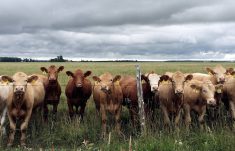It’s been quite the week in Ottawa.
Even in the midst of harvest it was impossible to ignore the very public departure of former leadership front-runner Maxime Bernier from the Conservative Party of Canada’s benches.
He didn’t just burn the bridges as he left, he took the time to dynamite the piers as he went, using words and phrases like “… too intellectually and morally corrupt to be reformed.”
A big part of his rationale for leaving was its reaction to his desire to do away with supply management in agriculture commodities.
Read Also

Canada’s import ban on Avix bird control system ruffles feathers
Canadian producers’ access to Bird Control Group’s Avix laser system remains blocked despite efficacy studies and certifications, as avian flu deaths rise.
Of the roughly 1,000 words of his statement to the press, approximately 250 of those words either directly or obliquely referred to the issue.
“I still cannot understand how a party that is supposed to defend free markets supports a small cartel that artificially increases the price of milk, chicken and eggs for millions of Canadian consumers,” was his first stated reason for leaving the party.
He went on to say the issue has become a primary stumbling block in NAFTA negotiations, and added the Conservative reaction has largely been to hollowly support the Liberal response. Bernier, however, noted this reaction was endangering the livelihood of millions of other Canadians dependent on trade with the U.S., and appeared to be based on responding to polls, rather than any adherence to core principles.
It’s not surprising to hear Bernier criticize supply management. He’s long characterized it as an inefficient cartel that unfairly increases the price of food products for the benefit of a relative handful of farmers to the detriment of millions of consumers.
The industry has always contended that analysis ignored the facts, insisting Canada has more stable pricing, avoiding the whipsaw ups and downs of the free market, which can frequently see consumers paying higher prices.
Other analysts point out the indisputable fact the U.S. system subsidizes its own farmers mightily through other routes and Canada’s approach at least limits the impact to the domestic market.
Regardless of one’s own take on the issue, Bernier did over the years make it his own, and there’s little doubt it is the issue that ultimately lost him the leadership of the Conservative Party of Canada.
Dairy sector insiders from Quebec have claimed as many as 7,500 votes were swayed by their campaign to neuter Bernier, not coincidentally almost exactly the number of ballots Bernier lost by.
Bernier certainly believes so, and stated as much in a chapter of his political memoir he chose to publish online, resulting in his subsequent ouster from the Conservative shadow cabinet and relegation to the backbench.
In a lot of ways it’s unexpected to see an agriculture topic playing such a pivotal role in the political future of the country.
It’s not that there’s been any shortage of issues, but they’ve been issues few outside of the sector itself cared passionately about.
The Canadian Wheat Board, for example, swayed a lot of votes in the grain industry, but few voters in downtown Winnipeg thought much about it, despite the presence of the organization’s head office at the time.
You have to reach back decades, to a point where nearly half the nation’s population lived on farms, to see an example of agriculture playing anything but a bit part in the political life of the nation.
Whether or not this new-found prominence is, in the long run, good for the dairy sector is questionable. There the answer would seem to depend on how successful Bernier’s future endeavours are.
He’s promising to launch a new political party that’s devoted to a purer form of ideological conservatism.
Konrad Yakabuski of the Globe and Mail called it “… little more than a temper tantrum by an attention-starved MP… ” and clearly doesn’t think much of his chances.
Others such as Tim Harper of the Toronto Star note that “in announcing he was leaving the Conservatives to form his own party, Bernier cannot be dismissed as a political footnote,” pointing out his proven fundraising abilities and media prowess.
Of course at this point everyone’s guessing just what this means and nobody actually has any answers. All we really know for sure is that Canadian politics has suddenly got a lot more colourful and there are a lot of balls in the air.
If Bernier ultimately does succeed, dairy farmers and others in the supply-managed sector may find themselves dodging these balls.
And that’s a far-from-impossible thing, as recent history has taught us. Just over two years before he became prime minister, Stephen Harper was the head of one of the fractured parties of the right and pundits were declaring a permanent Liberal hegemony.
In a country full of political second acts, Maxime Bernier may yet find his own, to the chagrin of some farmers.


















